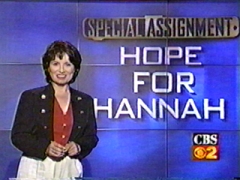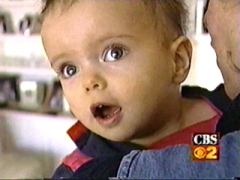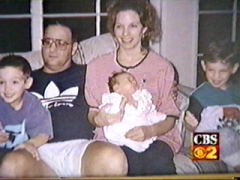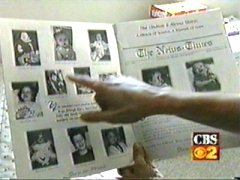 |
 |
 |
 |
| |
||||
Hope For HannahCBS 2 News Special Assignment  It's a story of desperation and hope. It's a story of desperation and hope. CBS 2 News' Linda Alvarez introduces us to a little girl who may be the only child in California diagnosed with a rare genetic disease called Canavan. Until recent years, all doctors knew about Canavan was that it affects the brain and that it was deadly, but now this little girl will be part of a brand-new experiment that could shed some further light on this disease -- as well as some hope. Special Assignment: Hope For Hannah aired Sunday, June 14, 1998 at 11 p.m. Her little arms and legs are perfect, but she can't move them on her own. She can't even hold up her head on her own, said CBS 2 News' Linda Alvarez. Hannah is nearly two years old but has the physical response of a newborn. Her eyes are clear and beautiful but she can't register what she sees. Even with tiny glasses, the world for Hannah is a confused blur. "When Hannah was about four-and-a-half or five months, I had a mother's instinct that something was wrong with her head," Saundra Geisinger told Alvarez. "I kept taking her to a pediatrician and he said, 'What is wrong with you? She's perfectly healthy.' " But Geisinger knew her daughter wasn't responding like her two sons had, so she kept looking for answers. "I took her for so many consults at the beginning (and received) wrong diagnosis after wrong diagnosis. I've had top doctors at children's hospitals all over the country tell me she's deaf," Geisinger said. "That's one day I really cried. She's blind and she's deaf. I said, 'Oh my God, what am I going to do?' " Finally Dr. Michel Phillipart at UCLA gave a name to Hannah's troubles. "It's Canavan disease or should be better referred to as a spongy degeneration," Phillipart told Alvarez. "I've never heard of the disease. No one I spoke with except this one doctor at UCLA had ever heard of the disease," said Geisinger. After the Geisingers were married, they went through genetic testing because their ancestors where Ashkenazi Jews, which means they are at greater risk for certain diseases. They didn't know that included Canavan disease, and no one ever tested them for it, said Alvarez. It is so rare that it occurs once in 10,000 births. Hannah's condition has put a strain on the entire family. Even her two brothers who don't have the disease are being affected because their parents must spend so much time with Hannah. "There's always somebody that needs me," said Geisinger. "If Hannah doesn't need me than I want to see my boys. My younger son was four and now he's turning six and I'm not sure how that happened." Since Hannah was diagnosed, the Geisingers have focused on cherishing every moment with her, documenting the happy times and recording her progress. Their first concern has been to keep Hannah happy while they still have her. "We get limited by people looking on the Internet and seeing this horrible diagnosis and put on the limits on her," said Geisinger. "(They say), 'She'll never do this, she'll never do that' (or) 'Take the easy way out and let her go in peace.' So you know, eleven years old, twelve years old, they don't got in peace. They're just sticking around so we got to keep them happy and keep them healthy." But now the Geisingers have reason to hope for a future for Hannah. There are 11 babies going through a Yale University study on new gene replacement and Hannah is one of them, according to Geisinger. The children all have Canavan disease and have been approved for the study. "It's a procedure where they basically do a hole in her head, inject the gene and hope it works," Geisinger said. The therapy hopefully will slow or even reverse the brain's deterioration, but there's no guarantee. "Most likely won't hurt, probably won't work but it might�so I'm going to take a chance," said Geisinger. More information:
|
||||||||||

|
||||||||||
|
Retire Rich
 |

 |
||
|
12 p.m.
Woman 2 Woman One of the stars from "Judging Amy" 5 p.m. 6 p.m. 11 p.m.
|
||
 |
||
|
4-5 p.m.
Judge Judy Ruler Of The Free World! 8:00 p.m. 8:30 p.m.
9:00 p.m.
|
||
| |
||
 Hannah loves dancing with her mom.
Hannah loves dancing with her mom.  He said Geisinger was right. Something was wrong with Hannah's head. In fact, Hannah had a rare genetic disorder that results in the loss of brain tissue and the deterioration of the central nervous system and early death.
He said Geisinger was right. Something was wrong with Hannah's head. In fact, Hannah had a rare genetic disorder that results in the loss of brain tissue and the deterioration of the central nervous system and early death.  Her play time is really physical therapy to strengthen her muscles and keep her strong. The Geisingers make a special effort to introduce her to new sensations, said Alvarez.
Her play time is really physical therapy to strengthen her muscles and keep her strong. The Geisingers make a special effort to introduce her to new sensations, said Alvarez. 

